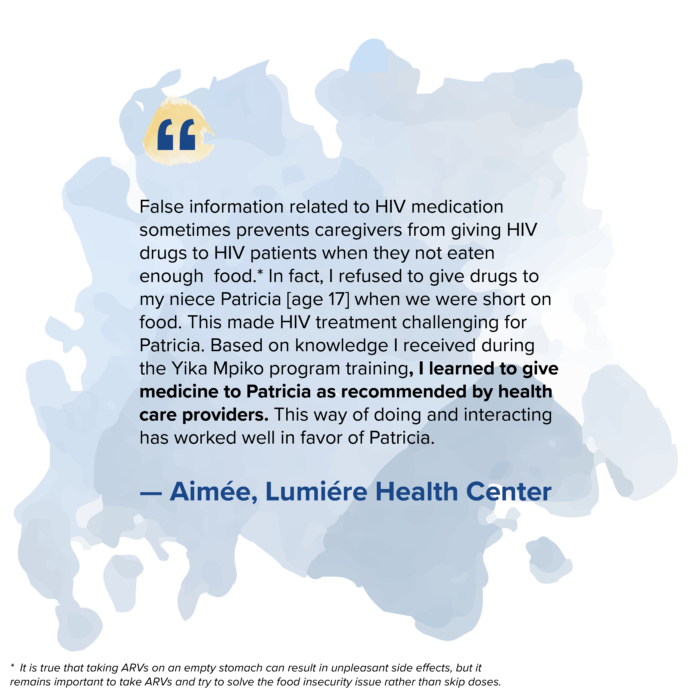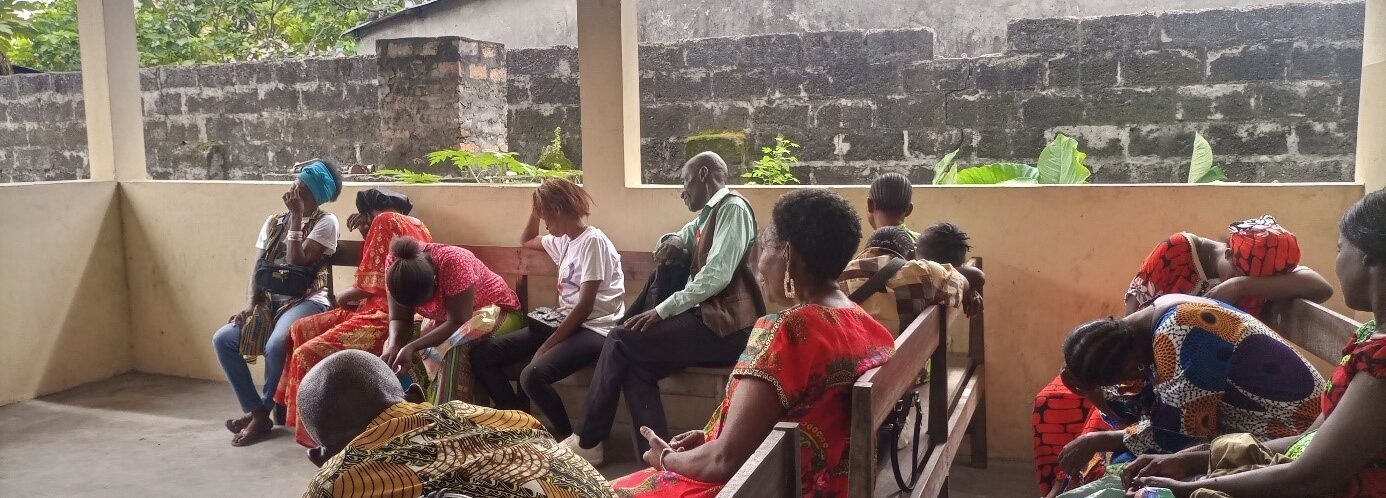Technical officers with the Elizabeth Glaser Pediatric AIDS Foundation (EGPAF) in the Democratic Republic of Congo (DRC) were distressed when they noticed that a significant number of children and adolescents living with HIV were not adhering well to their antiretroviral medication—resulting in less viral suppression and danger of illness and death. Through the IHAP-Kinshasa project, staff project developed an education and empowerment approach, which they named Yika Mpiko, which means “Be persistent” or “Don’t give up.”
“During the project implementation process, caregivers stated some reasons that prevent them and their children adhere to HIV treatment. These included negligence, false information, food insecurity, and lack of disclosure adolescents,” says Willy Vange, IHAP-Kinshasa health zone officer.
“Based on these causes, Yika Mpiko program staff set up a health coaching curriculum providing good information on how parents/caregivers can do to improve treatment adherence as well showcasing treatment adherence benefit versus risks due to non-adherence to treatment. We also shared the experiences of caregivers who succeeded in seeing the viral load of their children suppressed.”
Yika Mpiko was piloted in the Masina 2 Health Zone in Kinshasa, where 27 children with unsuppressed viral loads were closely looked after by their caregivers, under the coaching of the IHAP-Kinshasa project staff. Three months after implementing the program, 22 of the children (81%) had suppressed viral loads.
Caregivers gathered in a focus group to measure the impact of the Yika Mpiko program.
Voices of Caregivers
![“I was negligent regarding the HIV treatment of my niece Merveille [age 10] because I had no hope for her to live for a long moment in this world since her mother died of HIV. For that reason, I was not respecting health care recommendations regarding the indicated times for taking HIV drugs. Thanks to the knowledge I gained during the Yika Mpiko training session and post training interaction with health care providers and health community workers, I now know that my niece can live for many years and become a responsible old person.” — Waly, Bora Health Center](https://pedaids.org/wp-content/uploads/2022/06/DRCStoryQuoteGraphics-01-700x700.png)
![“Due to negligence in taking HIV drugs, the viral load of my nephew Prince [age 10] was not suppressed. The boy was living with his father and his stepmother at that time. His father had hidden Prince’s HIV status from his stepmother, which meant that Prince received his HIV treatment clandestinely. When the caregivers of children with unsuppressed viral load count were invited to be part of the Yika Mpiko program training session, Prince’s father asked me to go with the child. After the training, I decided to take Prince to my home to take care of him. Fortunately, Prince’s father agreed. At my home, I started to apply the skills I received during the training session. I am very happy that Prince viral load is suppressed after three months of close follow-up. Many thanks to IHAP-Project staff, Lunda health care providers, and health community workers.” — Bibiche, Lunda Health Center](https://pedaids.org/wp-content/uploads/2022/06/DRCStoryQuoteGraphics-02-700x700.png)
![“Due to negligence and lack of close follow-up at home by her stepmother, the viral load of my niece Lea [age 19] was not suppressed. At the facility, we received training on how parents can improve HIV treatment adherence for children. Considering what was health care providers told us, I decided to take Lea with me to my home, where I applied what I learned during the training. I kept Lea aware of the benefit of adhering to the recommended treatment versus the consequence of neglecting treatment adherence—which is only death. The training significantly promoted Lea’s treatment adherence and led to viral suppression.” — Brigitte, Mapela Health Center](https://pedaids.org/wp-content/uploads/2022/06/DRCStoryQuoteGraphics-03-700x700.png)

![“Since I am living with HIV, I disclosed my HIV status my niece Plamedi [age 14] and also disclosed her own HIV-positive status so that she will know the reason why she is taking medication every day. Despite this, Plamedi kept neglecting drugs when I was out of the house. During the Yika Mpiko program health literacy session, I was told to tell Plamedi about the benefit of adhering to HIV treatment which is being healthy versus the risk of refusing to take medicine—which is only death. These new communication skills have made Plamedi aware of the advantages and risks regarding adherence, or not, to HIV treatment. From that day, Plamedi is taking medicines on her own.” — Therese, Mapela Health Center](https://pedaids.org/wp-content/uploads/2022/06/DRCStoryQuoteGraphics-05_v2-700x700.png)
![“I was very negligent in all aspects of HIV treatment for my child Glody [age 8], mostly going out without taking care of my child. Thanks to the Yika Mpiko health literacy session, I have become very conscious regarding my child’s health in general, giving him medicines prior to going out. I am very happy that my child’s viral load count can be suppressed.” — Rachel, Lunda Health Center](https://pedaids.org/wp-content/uploads/2022/06/DRCStoryQuoteGraphics-06_v2-700x700.png)




